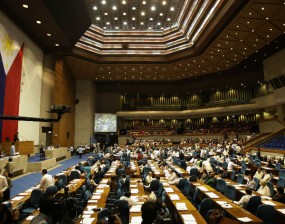Reproductive Health Law takes effect

Lawmakers attend a session at the House of Representatives Monday, opting to end debate on the controversial Reproductive Health Bill. AP FILE PHOTO
MANILA, Philippines – A controversial Reproductive Health Law came into effect in the Philippines Thursday after more than a decade of bitter opposition from the influential Catholic church, with women saying the change came as a relief.
The government is still threshing out how to implement the law, which proponents say will help moderate the nation’s rapid population growth, reduce poverty and bring down high maternal mortality.
But Catholic groups have already shifted their battle to the courts, questioning the law’s constitutionality. The church, which counts 80 percent of Filipinos as followers, disallows the use of artificial contraceptives.
A group of women lining up for contraceptives at a non-governmental organization’s health center in a slum area of Manila said the change of law came as a relief.
Housewife Nerissa Gallo, 44, who has already had 16 children, said it would bring contraceptives into the reach of the poor.
Article continues after this advertisementShe broke into tears as she recalled the difficulty she has faced in raising her children, four of whom died after suffering from diarrhea.
Article continues after this advertisementAsked about the church’s opposition, she said: “We don’t pay attention to that. They are not the ones who are giving birth again and again. We are the ones who have to find a way to care for the children.”
The medical charity Merlin praised the law as a “milestone” but said more efforts were needed to make sure it was properly implemented.
“There is likely to be cultural opposition… led by religious conservatives, which could make it hard for clinics to offer services,” country director, Maxime Piasecki, said in a statement.
President Benigno Aquino III signed the bill into law last month in the face of strong lobbying by the Catholic church, and religious leaders have vowed that the fight is not over.
The church is now relying on lay groups that have filed petitions with the Supreme Court questioning the constitutionality of the law, said Roy Lagarde, a spokesman for the country’s Catholic bishops.
The bishops will hold a regular meeting this weekend where measures to oppose the law will be discussed, he added.
The law’s chief author Congressman Edcel Lagman said he was confident the court would uphold the change.
“We have long expected that the opposition will go to the Supreme Court. We have prepared for this eventuality,” he told AFP.
Although took effect as of Thursday, Hazel Chua, an official at the Health Department’s family planning unit, said they were still preparing implementation rules and regulations, which will only be released in April.
Under the law, government health centers will have to have a supply of contraceptives, unlike in the past when local mayors could be intimidated by the church into not providing birth control services, she said.